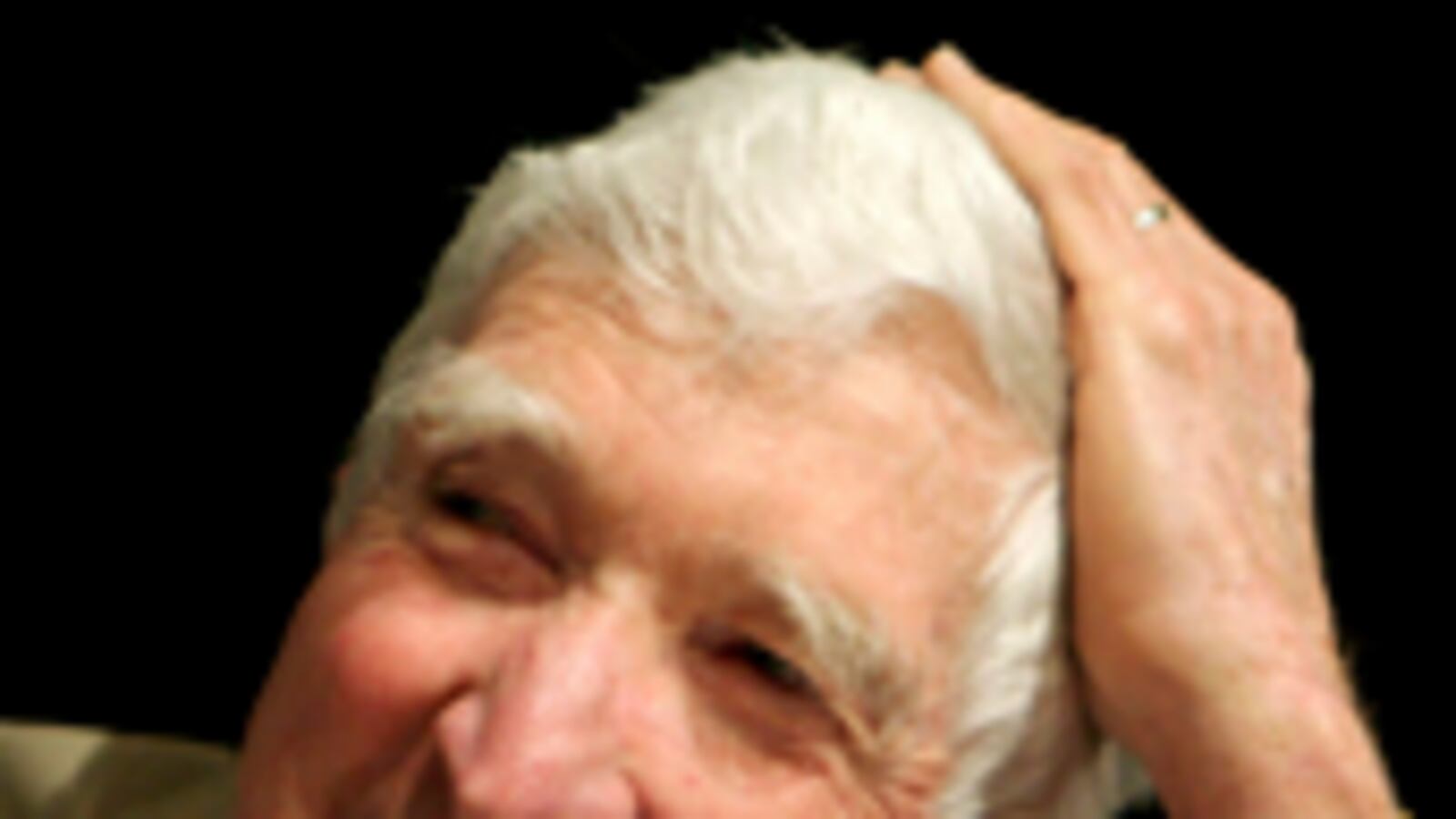Plus: Check out Book Beast, for more news on hot titles, authors and excerpts from the latest books.

Gandhi once famously described the four stages of nonviolent protest: “First they ignore you, then they laugh at you, then they fight you, then you win.” John Updike, who died last Tuesday of lung cancer at the age of 76, experienced something like the same phases of response to his work— great art is nonviolent protest, after all—but in reverse.
Amid the routine homages to Updike that have been appearing over the past week, one fact has been almost entirely airbrushed out of his life. This astonishingly gifted and creatively vital writer, who started to “win” at the age of 22 when The New Yorker bought a story and a poem that he had submitted; who received two Pulitzers, two National Book Awards, and four National Book Critics Circle Awards; whose enormous body of work had earned him global recognition—this literary genius had, by the end of his career, become either a target of ridicule or been forgotten by literary culture altogether.
Recently, the novelist Nicole Krauss offered a sharper judgment: For her, Updike was “an old fart.” And Harold Bloom sniffed him away as “a minor novelist with a major style.”
It was left to Updike himself to note the puzzling fate of his reputation, posthumously, in The New York Times, which on the day following his death published a poem of his called Requiem: “…a shrug and tearless eyes/Will greet my overdue demise;/The wide response will be, I know,/’I thought he died a while ago.’”
No doubt Updike had somewhere in mind the incredible slight inflicted on him by Cynthia Ozick, a passive-aggressive Updike-hater, in a review of his collected early stories that she published in The New York Times Book Review in 2003: “So enduringly stamped and ineradicably renowned is Updike that it was more tribute than gaucherie when, only the other day, someone (a demographer, as it happens, with wider views of the shiftings of lives) asked, ‘Is he still alive?’”
The publication of Requiem was not just sad, it was heavily ironic. Updike’s phenomenal productivity, his graphomaniac compulsion to annotate every lush detail of existence had been one of his detractors’ chief grievances. (Leave it to him to have the last mordant word on his career from beyond the grave.)
“Has the son of a bitch ever had one unpublished thought?” David Foster Wallace nastily imagined readers “under 40” asking about Updike, in a 1997 essay. Updike’s most tireless persecutor, the literary critic James Wood, was less colloquial but more cutting: “It seems to be easier for John Updike to stifle a yawn than to refrain from writing a book,” Wood wrote in 2001.
No American novelist with Updike’s accomplishments has ever been as dumped on as the author of the “Rabbit” tetralogy and dozens of other books. A few of Updike’s characters—Rabbit; the Maple family; Updike’s unlikely alter ego, sad-sack Jewish writer Henry Bech—have become part of American folklore. Yet he was not just attacked. He was abused.
There was praise in the last decades, to be sure: a complex and beautiful review of In the Beauty of the Lilies by A.O. Scott in The Nation; the four Rabbit novels coming in as “runner-up” in The New York Times Book Review’s poll of the best works of fiction during the past 25 years; and other recognitions of Updike’s rare achievements.
But people reacted to Updike’s plentiful writings—23 novels, 146 New Yorker stories, more than 500 reviews and poems in The New Yorker, dozens of humor pieces, gem-like art criticism in The New York Review of Books—with something like angry contempt, as if his prodigious publishing on diverse subjects were not the Goethean force of nature that it was, but some kind of Ponzi scheme directed at sucker readers. Last spring, an editor of The Los Angeles Times Book Review publicly implored Updike to publish less, surmising that “perhaps there’d be more room at the bigger publishers” for “writers who are doing exciting things.”
Many of the obituaries and tributes of the last week seemed either patronizing or mechanical. “Blogger-like in his determination to turn every scrap of knowledge and experience into words,” wrote Michiko Kakutani. Lorrie Moore gave Updike a gold star for his “erudition and hard work.” Also for his “enthusiastic witnessing.”
Verlyn Klinkenborg confessed, “I like Updike’s nonfiction best,” but offered this pat on the recently deceased head: Updike was not only “a maker of sentences,” but “one of the very best.” Everyone agreed that Updike was the country’s No. 1 “man of letters,” which is what you say about a long-lived book-reviewer at his (forced) retirement dinner, but not about an artistic genius. With a friendly back of the hand, Updike was compared at least twice to Anthony Trollope, only a handful of whose 47 novels are worth reading today.
During the past decade or so, the negative responses to Updike were devoid of the respect due to a person, let alone a great artist. In that same several-thousand-word essay from 1997, Wallace quoted a friend who insulted Updike with adolescent verve as “just a penis with a thesaurus.” Recently, the novelist Nicole Krauss offered a sharper judgment: For her, Updike was “an old fart” (an Updike admirer could be forgiven for imagining that Updike’s gastric occasions, such as they might have been, were veritable lieder compared to Krauss’s noxious adventures in Holocaust kitsch). Harold Bloom sniffed him away as “a minor novelist with a major style.”
But it was James Wood who opened the floodgates for Updike-hatred. No critic had ever come at Updike so relentlessly, viciously, and articulately as Wood. After Wood began to draw blood, it was open season. Updike’s detractors had to inflate their vitriol just to keep up.
From almost the time he started to work at The New Republic in the mid-'90s, Wood began writing about Updike as if making slashing comments on a student’s midterm exam. The two-time Pulitzer-Prize winner wrote prose that suffered from “a professionalized ordinariness.” Updike actually published in airline magazines, Wood mocked. Updike’s language “lifts itself up on pretty hydraulics.” His entire body of work was “not only dated, but provincial and minor.” Wood concluded that “Updike is not, I think, a great writer.” And why was this? “Because Updike is unable to picture a reality more powerful than his own. He is unable to picture the opposite of his own reality.”
So much for the hyper-delicate, exquisite, Proustian sensibility that created Rabbit Angstrom, the former high-school basketball star, kitchen-gadget and car salesman, afflicted so powerfully and convincingly by tragedies and failures that never touched Updike’s starry life. Not to mention Henry Bech, an urban Jewish novelist as “opposite” to Updike as Anna Karenina was to Tolstoy.
When The New Yorker, which had been Updike’s home since he was in his early twenties—to the point where both magazine and writer were almost synonymous with each other—hired Wood in 2007, it was hard to imagine that Updike did not experience it as harsh rejection, or at the painful least, as a brutal judgment of his current worth.
Updike’s close association with The New Yorker was, in fact, a Faustian bargain that both made his career and obscured his inestimable worth as a literary artist. No major American novelist has ever been so intimately identified with a magazine—no major American novelist that I can think of has ever been identified with a particular magazine, period. In The New Yorker’s current issue, largely devoted to Updike, Adam Gopnik writes that Updike “took, and kept, a tone” from the magazine, which was the “White-cum-Thurber sound of the New Yorker… that… lingered in his work till the very end.”
What The New Yorker bestowed upon the humbly born, psoriasis-afflicted, stuttering young man from the Pennsylvania provinces was a loyal and lucrative home, prestige, glamour, and all the gilt-edged trappings and hidden entitlements of literary life: the entrée to privileged circles; the rarefied imprimatur that gave him an edge in literary competition, and also provided him with a special connection to Knopf, the country’s most powerful publishing imprint; and the magazine’s hallowed, sheltering mystique.
What Updike surrendered in return was the popular image of the novelist as an unaffiliated, independent free agent, uninflected by institutional influences or pressures, whose writing was unalloyed by a collective “tone” or “sound.”
Of course, plenty of other reasons exist for the special spleen directed at Updike. There were his middle-class, suburban, frankly Protestant settings, which drove modernist Jewish critics like Ozick and Bloom up a wall—when in 1989 Updike an essay that defended his decision to support the Vietnam War 20 years earlier, in Commentary, which was the by-then neoconservative headquarters of Jewish intellectual modernism, he must have known that he was entering a hitherto locked door.
Then there was Updike’s 1986 speech at the PEN conference that year. As Norman Mailer and others thundered against the oppressive state, Updike slyly celebrated America’s greatness in the form of a modest tale about a reliable postman delivering to Updike uncensored mail. (Was that an unconsciously defiant reference to editorial correspondence, and thus to Updike’s fecundity?) Updike’s 2006 speech at the Book Expo convention in Washington, D.C., in which he predicted the death of the author and the book at the hands of Google and the Internet’s “electronic anthill,” marginalized him even further.
But it was Updike’s Dorian-Gray-like relationship with The New Yorker that finally determined his ludicrously unfair treatment by the cognoscenti. He was not, in people’s stereotype-laden minds, a novelist confronting life’s elements and ordering them out of his own guts, guile, and gift. He was not a sovereignly autonomous Hemingway, or Mailer, or Roth. He was, in the end, a “New Yorker writer.” The fabled magazine both gave Updike his renown and had the effect of explaining it away.
When the institution rotated on the axis of its need and brought into its fold Updike’s toxic foe—the type of cuts Wood made are like poison to a writer’s ego and will—it was not being malicious, or personal. It was being an institution. And Updike, whose fiction concerns men seeking a home in a world where mortality sweeps all stability away, stayed in what had been the warmest and most protective of homes.
But all’s well that will, indeed, end well. Now that we know Updike is dead, we will start to remember how incandescently and uniquely he was alive, just a short “while ago.” As the narrator writes in Updike’s immortal story, “A Sense of Shelter,” about an adolescent who has an epiphany about life’s transience: “Between now and the happy future predicted for him he had nothing, almost literally nothing, to do.”
Lee Siegel has written about culture and politics for numerous publications. He is the author of three books: Falling Upwards: Essays in Defense of the Imagination; Not Remotely Controlled: Notes on Television; and, most recently, Against the Machine: Being Human in the Age of the Electronic Mob. In 2002, he received the National Magazine Award for Reviews and Criticism.





